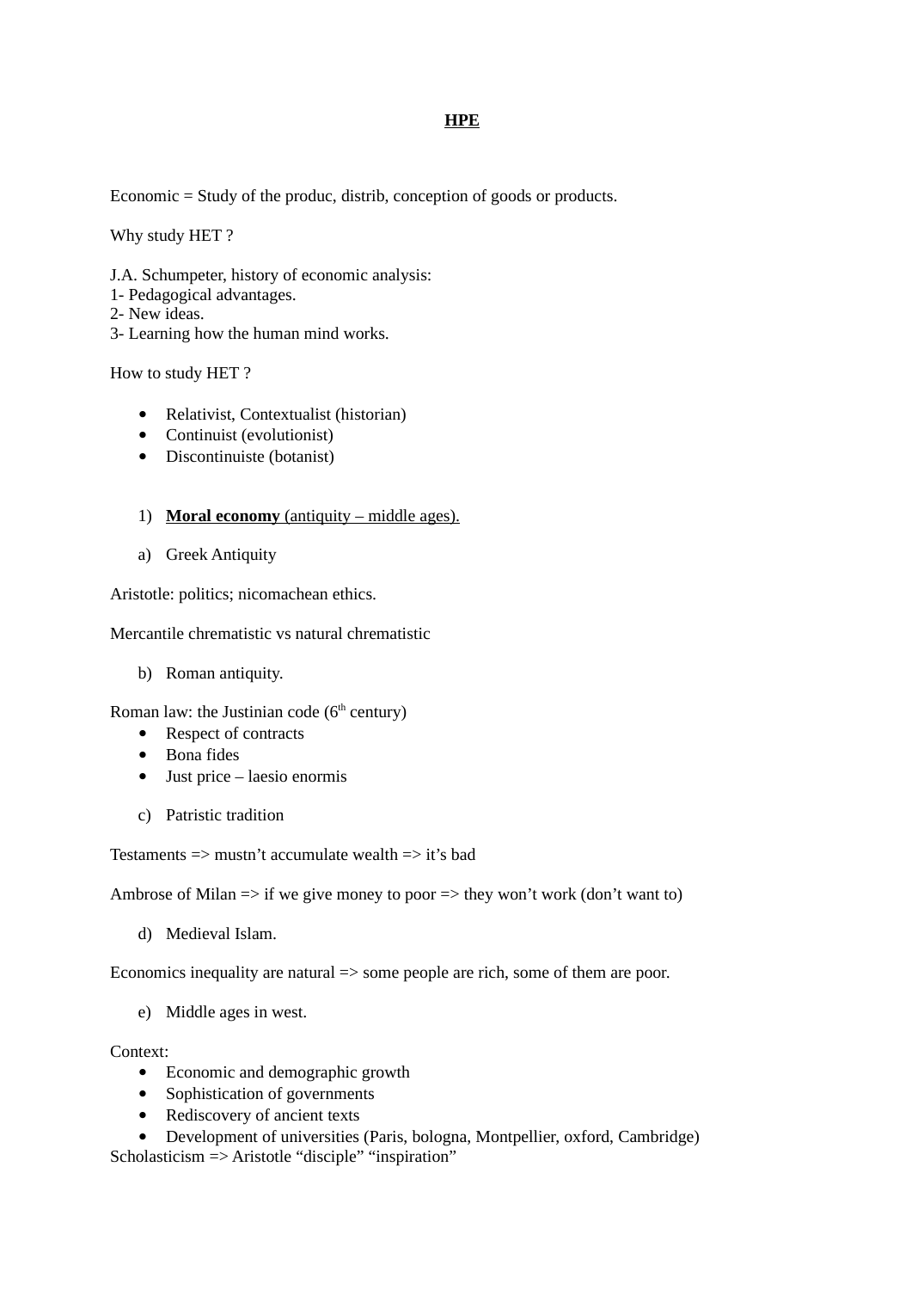HPE
Publié le 06/12/2021

Extrait du document
Ci-dessous un extrait traitant le sujet : HPE. Ce document contient 1121 mots. Pour le télécharger en entier, envoyez-nous un de vos documents grâce à notre système d’échange gratuit de ressources numériques ou achetez-le pour la modique somme d’un euro symbolique. Cette aide totalement rédigée en format pdf sera utile aux lycéens ou étudiants ayant un devoir à réaliser ou une leçon à approfondir en : Encyclopédie
HPE
Economic = Study of the produc, distrib, conception of goods or products.
Why study HET ?
J.A. Schumpeter, history of economic analysis:
1- Pedagogical advantages.
2- New ideas.
3- Learning how the human mind works.
How to study HET ?
Relativist, Contextualist (historian)
Continuist (evolutionist)
Discontinuiste (botanist)
Moral economy (antiquity - middle ages).
Greek Antiquity
Aristotle: politics; nicomachean ethics.
Mercantile chrematistic vs natural chrematistic
Roman antiquity.
Roman law: the Justinian code (6th century)
Respect of contracts
Bona fides
Just price - laesio enormis
Patristic tradition
Testaments => mustn't accumulate wealth => it's bad
Ambrose of Milan => if we give money to poor => they won't work (don't want to)
Medieval Islam.
Economics inequality are natural => some people are rich, some of them are poor.
Middle ages in west.
Context:
Economic and demographic growth
Sophistication of governments
Rediscovery of ancient texts
Development of universities (Paris, bologna, Montpellier, oxford, Cambridge)
Scholasticism => Aristotle "disciple" "inspiration"
Summary: economic thought is indissoc...
HPE
Economic = Study of the produc, distrib, conception of goods or products.
Why study HET ?
J.A. Schumpeter, history of economic analysis:
1- Pedagogical advantages.
2- New ideas.
3- Learning how the human mind works.
How to study HET ?
Relativist, Contextualist (historian)
Continuist (evolutionist)
Discontinuiste (botanist)
Moral economy (antiquity - middle ages).
Greek Antiquity
Aristotle: politics; nicomachean ethics.
Mercantile chrematistic vs natural chrematistic
Roman antiquity.
Roman law: the Justinian code (6th century)
Respect of contracts
Bona fides
Just price - laesio enormis
Patristic tradition
Testaments => mustn't accumulate wealth => it's bad
Ambrose of Milan => if we give money to poor => they won't work (don't want to)
Medieval Islam.
Economics inequality are natural => some people are rich, some of them are poor.
Middle ages in west.
Context:
Economic and demographic growth
Sophistication of governments
Rediscovery of ancient texts
Development of universities (Paris, bologna, Montpellier, oxford, Cambridge)
Scholasticism => Aristotle "disciple" "inspiration"
Summary: economic thought is indissoc...
↓↓↓ APERÇU DU DOCUMENT ↓↓↓


